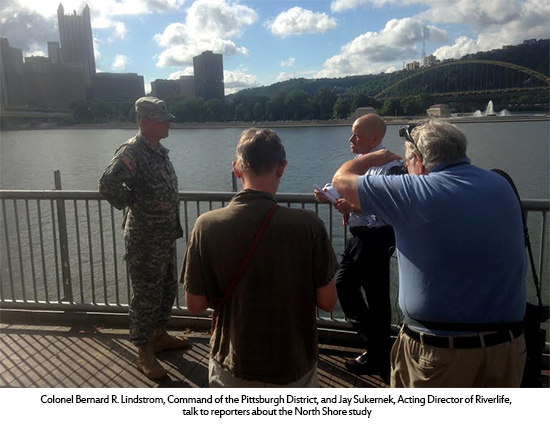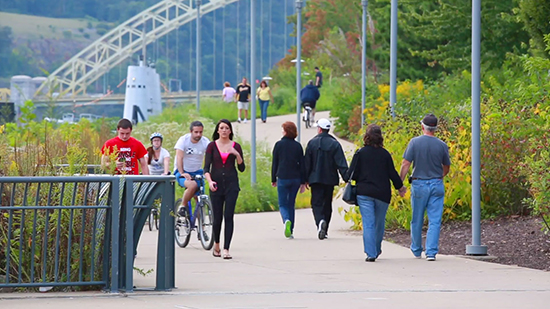Natural riverbank restoration could help restore riverfront birds, animals and plants

August 12, 2015
PITTSBURGH- The U.S. Army Corps of Engineers and Riverlife, the nonprofit organization that works with property owners, elected officials, and community organizations to build Pittsburgh’s riverfront park system, announced today the start of a study aimed at restoring the degraded riverbank ecosystem along the North Shore.
Beginning this month, the study will look at ways to create a safer, more diverse natural habitat along the North Shore riverbank that can co-exist with the North Shore’s existing entertainment, sporting, recreation and mixed-use development activities. Creating a natural landscape buffer to manage stormwater runoff before it reaches the river is also an objective.
“When the North Shore first came online in early 2000, it knit together destinations such as Heinz Field, PNC Park and the Carnegie Science Center with green public open space, trails and boat launches and proved that Pittsburgh was truly a river city,” said Jay Sukernek, Riverlife acting director. “Fifteen years later, the time is right to look at making further improvements to the riverbank to bring back natural habitat in ways that safely interface with and complement the North Shore activities that people love.”
In partnership with Riverlife, the Army Corps will evaluate alternatives for sustainable aquatic ecosystem restoration along the right-descending bank of the Ohio River, extending from just upstream of the Carnegie Science Center to downstream of the West End Bridge. The initial study area covers approximately 4,000 feet of riverbank and 12.6 acres of Pittsburgh’s bustling North Shore.
“This is a great opportunity for the Corps to partner with a local non-profit organization and leverage federal resources to improve the environment and the biodiversity of the river,” said Colonel Bernard R. Lindstrom, Command of the Pittsburgh District.
After initial environmental assessments of the North Shore began earlier this year, the study is anticipated to kick off this month and conclude in January 2016 with a detailed project report. Key activities of the study include conducting further environmental and vegetation assessments, preparing a comprehensive real estate plan, conducting engineering and landscape architectural studies, and completing the final report and recommendations.
“The study’s outcome will determine what type of riverbank restoration is possible, and how it could improve Pittsburgh’s ecosystem of native plants and wildlife,” said Mr. Sukernek. “Imagine walking to a Steelers game or riding your bike along the North Shore trail next to a natural riverbank landscape that hosts birds and native wildflowers. We think this riverbank restoration will become an attractive destination in and of itself, a perfect fit with the cultural and tourism destinations already thriving on the North Shore.”
Total project study costs are projected to be $258,000. The North Shore aquatic ecosystem study is funded as a partnership between Riverlife and the U.S. Army Corps of Engineers, with support from The Richard King Mellon Foundation, The Heinz Endowments, and The Buhl Foundation.
###
About the U.S. Army Corps of Engineers
Pittsburgh District’s 26,000-square miles include portions of western Pennsylvania, northern West Virginia, eastern Ohio, western Maryland and southwestern New York. Our jurisdiction includes more than 328 miles of navigable waterways, 23 navigation locks and dams, 16 multi-purpose flood control reservoirs, 42 local flood protection projects and other projects to protect and enhance the Nation’s water resources, infrastructure and environment.
About Riverlife
Riverlife (formerly Riverlife Task Force) is a public-private partnership established in 1999 to guide and advocate for the redevelopment of Pittsburgh’s riverfronts. Riverlife works to reconnect Pittsburgh with its rivers by bringing recreation, ecological restoration and economic opportunity back to our waterfronts. www.riverlifegh.org
CONTACTS:
Stephan Bontrager, Riverlife
(p) 412.258.6636 x105
(e) stephan@riverlifepgh.org
Ryan Fisher, U.S. Army Corps of Engineers
(p) 412.395.7588
(e) Ryan.Fisher@usace.army.mil

